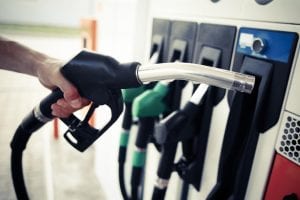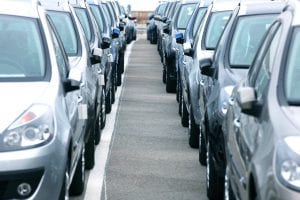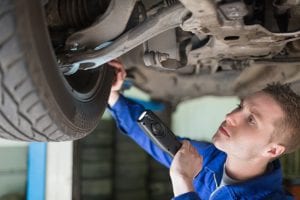The UK’s new car market is struggling, with sales down last year, and a further drop already forecast for 2018. March saw the 12th consecutive month of decline, but why have the sales of new vehicles gone from record highs to such lows?
The first thing to remember is that despite what the mainstream press states, the market is not really ‘struggling’. Last year, over 2.5 million vehicles were sold in the UK, compared to 2.69 in 2016. A drop of around 200,000 vehicles cannot really be called a crisis, especially as 2016 was a record year, with the highest sales figures ever recorded.
It is a case that over time, sales figures will ebb and flow. Yet in this instance, there are a few factors which are inorganically causing a seismic shift in the industry, and this could end up being good news for the aftermarket.
Diesel
 No matter where you look, it is impossible to miss any news regarding diesel vehicles. It all began with the Volkswagen (VW) Dieselgate scandal in September 2015. Until then, the technology was riding high in the market, with dominance over petrol and fleets in particular loving its economy.
No matter where you look, it is impossible to miss any news regarding diesel vehicles. It all began with the Volkswagen (VW) Dieselgate scandal in September 2015. Until then, the technology was riding high in the market, with dominance over petrol and fleets in particular loving its economy.
Since then it’s come crashing down. Petrol finished with a marginally higher market share in 2015, grew the gap in 2016 and then diesel fell off the cliff. The gap between the two fuels last year was 11.3%, with diesel taking just 42% of total sales in the year.
Press demonisation and government policy (more on that in a moment) is likely to blame, with today’s diesels cleaner than ever. In addition, while the worry is around nitrogen oxides (NOx), much of which is captured by the DPF, diesel pumps out significantly less CO2. It is worth noting that last year, levels of carbon dioxide rose in the UK for the first time in 20 years, as diesel sales fell 17.1%.
Carmakers have a target for their fleets. They must achieve an average of 95g of CO2 per kilometre of vehicles sold. A fine of €95 per gram of CO2 above this limit, multiplied by the number of vehicles a company sells in Europe during 2020, could mean huge financial implications. BMW, for example, are currently facing a projected fine of €700 million, with VW looking at €1.7 billion, as its sales include Audi, Skoda, Porsche, SEAT and so on.
This is pushing manufacturers into developing away from diesel, focusing instead on electric and hybrid vehicles. This in turn means cleaner diesel technology is not being developed, and therefore, sales will continue to fall. With no true viable alternative, as electrification is still in its infancy, many will either move to petrol, or wait.
Brexit
 Buying a new car is the second most important financial decision after buying a house, the old adage goes. Therefore, any financial instability in the country will hit the market. New vehicle sales did collapse in 2009 during the economic crisis that shook the world, and following the Brexit vote in 2016, markets again took a wobble.
Buying a new car is the second most important financial decision after buying a house, the old adage goes. Therefore, any financial instability in the country will hit the market. New vehicle sales did collapse in 2009 during the economic crisis that shook the world, and following the Brexit vote in 2016, markets again took a wobble.
From this wobble, the UK has not really fully recovered. Despite the leave and remain campaigns, no one really knows what will happen when the country leaves the European Union. Therefore, investing in something, especially when consumers are using finance to pay for new vehicles, is not on the agenda for many.
Companies could collapse or move away from the UK leaving people out of jobs. Businesses investing in fleets may need to tighten their purse strings and that means not investing in new stock. All of this adds into the drop in UK sales figures.
VED
 Another factor in last year’s sales drop is the increase in Vehicle Excise Duty (VED) from April last year. The Government amended the VED bands and introduced a first-year rate, followed by a standard yearly rate of £140.
Another factor in last year’s sales drop is the increase in Vehicle Excise Duty (VED) from April last year. The Government amended the VED bands and introduced a first-year rate, followed by a standard yearly rate of £140.
This may sound like it benefits heavy polluting vehicles, prior to this, those emitting 201-2259/km paid £290 a year. However now those drivers will pay £1,240 in year one (unless the vehicle is a diesel, in which case it will be £1,760).
It also penalises vehicles emitting up to 150g/km, which end up paying more VED than they would up to April 2017. In fact, those emitting up to 120g/km, which includes a lot of small diesel vehicles, were paying just £30 per year. Therefore, an increase of £110 annually is a big deal.
March 2017 saw the highest monthly sales record in the UK for new vehicles. From April onwards, the market declined. Drivers rushed to buy new-plate vehicles that would fit into the older VED bands, rather than suffer the new rates. Therefore, the market contracted in each month after, and is expected to drop again this year as new first-year rates for diesels are implemented.
Used car market
 The UK’s used vehicle market saw a drop in sales during 2017, although the market remained strong compared to the country’s new registration figures.
The UK’s used vehicle market saw a drop in sales during 2017, although the market remained strong compared to the country’s new registration figures.
During the year, used car sales fell by just 1.1%, with more than 8.1 million vehicles changing hands, according to the latest SMMT figures, which are released quarterly. Despite a 5.1% fall in the market in the fourth quarter, annual transactions were at their second highest level, following the record set in 2016.
To highlight the impact that VED rates have had on the diesel market, used diesel car transactions rose 3.3%, with more than 3.3 million motorists (40.8% of buyers) investing in one. Vehicles registered before April 2017 still carry their favourable VED rates.
Aftermarket implications
 The drop in new car sales, and the movement of people into the used car market, is going to be good news for the independent aftermarket in the short to mid-term. Used cars are more likely to come into garages, and the increased trade in diesels, which are often more expensive to repair, means workshops and suppliers will continue to have this stream of work and income.
The drop in new car sales, and the movement of people into the used car market, is going to be good news for the independent aftermarket in the short to mid-term. Used cars are more likely to come into garages, and the increased trade in diesels, which are often more expensive to repair, means workshops and suppliers will continue to have this stream of work and income.
Older cars need more repairs, and with fewer new vehicle sales, the average age of the UK car parc will increase. There will also be more consumers considering cost-saving exercises if they cannot splash out on a new vehicle, which means they will consider moving from dealership to independent servicing.
The UK new car market is expected to drop by around 4% again in 2018 and may not rise again for a couple of years afterwards. Yet while there is consumer demand for vehicles, old and new, independent garages will benefit.




You must be logged in to post a comment.